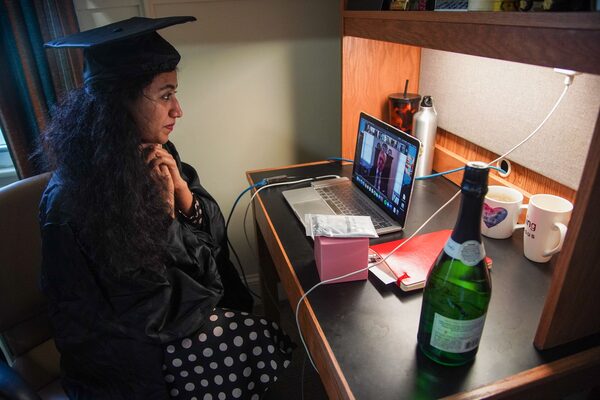Good evening, here are the coronavirus updates you need to know tonight.
Top headlines:
- How will COVID-19 change our lives, our country, our cities and our world?
- How the coronavirus will change work, industry and personal finance forever.
- After COVID-19, we’ll never take vacations, watch movies or root for sports teams in the same way.
In Canada, there have been at least 75,770 cases reported, which is more than double the number from 26 days ago.There have also been at least 37,723 recoveries and 5,677 deaths. Health officials have administered more than 1,328,555 tests.
Worldwide, there have been at least 4,598,628 cases confirmed, 1,666,225 recoveries and 309,918 deaths reported.
Sources: Canada data is compiled from government websites, Johns Hopkins and COVID-19 Canada Open Data Working Group; international data is from Johns Hopkins University.
Coronavirus explainers: Updates and essential resources • Coronavirus in maps and charts • Lockdown rules and reopening plans in each province
Photo of the day

Varsha Thebo, a 27-year-old student from Pakistan, attends her online graduation ceremony in her bedroom at the International Student House where she resides at Georgetown University, in Washington, D.C. on May 15, 2020. Photo by Agnes Bun / AFPAGNES BUN/AFP/Getty Images
Number of the day
Between 43 and 54 per cent
The International Air Transport Association, which represents 290 airlines, argues that empty seats aren’t the best way to limit the spread of COVID-19. Airlines with fewer seats will be forced to raise air fares by between 43 and 54 per cent, depending on the region, according to its estimates.
- Air Canada, WestJet Airlines and Delta Air Lines have said they will leave adjacent seats empty, amid speculation some governments will require it.
What it means: Discounters will be among the airlines that won’t return after the crisis wanes, industry observers agree. Those that remain will be forced to charge more to cover the high cost of physical distancing at 30,000 feet.
Coronavirus in Canada
There are currently at least 2,873 hospitalized cases, a 3% drop from a week ago. Of those 392 are in intensive care.
- Next week the Quebec government will be lifting checkpoints that prevented thousands of Ontario residents from going to their cottage across the provincial border. Quebec residents received permission to go to their cottages starting last Monday.
- This long weekend, mayors of tourist hotspots across B.C. are worried people will visit despite the potential for virus spread. Different rules between provinces are magnifying the tension in the southeastern part of the B.C., where the economy depends on tourists and vacation homeowners, primarily from Alberta.
- The Saskatchewan Health Authority announced Saturday that it was ending an outbreak declaration for the facility at La Loche Health Centre, which had been in effect since April 17.
Ottawa has been placing bulk purchase orders since March for personal protective equipment on behalf of the federal government, provinces and territories. A worldwide supply crunch is being blamed for Canada having to slash its order of N95 respirator masks by almost 50 million in the past two weeks. Only a fraction of the masks received have met health standards.
- A higher number of harassment cases against East Asian people has taken place across the country since the pandemic began. They are being targeted as being responsible for the devastation wrought by COVID-19, which originated in China. For example, Vancouver police have tallied 20 hate incidents directed at people of East Asian descent this year, compared with 12 in all of 2019.
Coronavirus around the world
Worldwide, there have been at least 4,598,628 cases confirmed, 1,666,225 recoveries and 309,918 deaths reported.
- In Italy, the government approved a decree that will allow travel to and from abroad from June 3 and will allow free travel across the country from that same day. Some regions had pushed for a swifter rollback, but Prime Minister Giuseppe Conte has insisted on a gradual return to normal to prevent a second wave of infections.
- As Mexico moves toward a gradual reactivation of its economy Monday, the number of new coronavirus infections grows higher every day. President Andrés Manuel López Obrador is telling the public that the fight against the virus depends on continued social distancing, while describing how other areas will begin to return to work.
- Germany’s soccer season resumed in unprecedented conditions. Players had been warned to desist from spitting, handshakes and hugging with the games keenly watched by the rest of the soccer world, hoping to restart their own leagues.
- A deadly police raid in Rio de Janeiro, Brazil on suspected drug traffickers on Friday morning drew crowds into the streets of a neighbourhood under quarantine, provoking criticism from residents and activists.

Fortuna Duesseldorf's German head coach Uwe Roesler sits on the sideline during the Bundesliga soccer match on Saturday, May 16, 2020. Photo by Sascha Schuermann/AFP pool via APSascha Schuermann/AFP/Getty Images
Question and answer
Question: Are we still going to use cash?
Answer: Canadians’ use of cash has been on the decline for years as e-commerce and tap-and-go payments displaced legal tender.
The novel coronavirus and the resulting restrictions on retailers has accelerated that decline, with health concerns about contaminated cash adding to long-standing technological pressures.
Early indications suggest two trends are driving the move away from cash since the mid-March onset of the coronavirus crisis. The first is a surge in e-commerce as consumers turn to virtual retailers.
Equally as significant is a sharp rise in electronic transfers. Interac Corp. says the number of first-time e-transfer users has risen by 62 per cent since mid-March.
Tracey Black, president and chief executive officer of Payment Canada, said she believes those behavioural shifts will endure after the lockdowns. And she said that central banks are likely to accelerate plans to introduce digital currencies that could further displace cash.
But Ms. Black agrees that cash will remain in the picture, saying it is sometimes simply the most convenient option. “It’s really fast to hand someone a twenty.”
The Globe’s health columnist André Picard answered reader questions on social distancing and many additional topics.
Distractions
For the folks who could use a bit of cheering up, here are some brighter reads:
- Joseph Rosen: For years I felt rejected by my Hasidic neighbours. But COVID-19 brought us together
- Erin Anderssen: Can we save summer 2020?
- John Doyle: Uplifting stories from sports and the sweet, ordinary world
And: Share you puzzle progress on Twitter and Instagram with #GlobeCrossword. On your phone? Email the puzzles to yourself.
More Globe reporting and opinion
- Psychology researchers and those who study optimism say there are both advantages and disadvantages to expecting the best – and for this COVID-19 crisis, a little pessimism may not be a bad thing.
- In all recessions, there is tension between company profits and the number of people that can be employed, or how much is expected of them. Some professors looked at seven tensions as we move away from the traditional command-and-control style.
- An expectant mother says the father of her baby has been prevented from crossing the U.S-Canada border because he was told travelling for the birth of their son is not essential. Adam Farrell said he made two attempts to cross the border in the same day last month.
- Marcus Gee: “The idea that senior governments have some sort of magic credit card is a comforting fantasy. Even they will face a bill for all their spending, as necessary as most of it is. Cities won’t be exempt either."
- Elizabeth Renzetti: “The psychological shift toward viewing masks as symbols of safety is well under way, however, and their power may lie in that symbolism as much as their public health benefits.”
Information centre
- Here’s what you should do if you are newly laid off; how to apply for CERB, EI, and other financial benefits; and other coronavirus and employment questions answered.
- How to minimize damage to your credit score; how to manage retirement anxiety during difficult times; and things to think about if you’re considering home delivery.
- Here are the expectations for self-isolation; tips for managing anxiety; and protecting your mental health.
- How to get physical distancing right; measures condo buildings are taking to encourage physical distancing; and what you can do to help slow the spread of coronavirus.
- Here are the essentials to stock up on and how to shop safely for groceries; the best pantry staples; foods to eat to maintain an immune system-friendly diet; and how to keep a healthy diet while working from home.
- How to break a bad habit (like touching your face) and what to do if you think you have the virus.
What are we missing? Email us: audience@globeandmail.com. Do you know someone who needs this newsletter? Send them to our Newsletters page.
Have questions about the coronavirus? Email audience@globeandmail.com.
 Sierra Bein
Sierra Bein